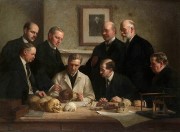|
Home
|
Nov 22, 2021
This week’s themeToponyms from England This week’s words Piltdowner Devonshire kersey Halifax Aldermaston 
Piltdown skull being examined. The forger Charles Dawson is third from left in the back row.
Art: John Cooke, 1915 Previous week’s theme Words with opposite or contradictory meanings A.Word.A.Day
with Anu GargIt takes a village to raise a child, they say. The same can be said for a language. In the case of the English language, it took many countries. England is considered its home, but to nurture it and to help it thrive, the language had generous assistance* from assorted Germanic tribes, the Vikings, and the French. Also, from people who spoke many other languages around the world. A global village raised it and made it what a good little language it is. Empires come and go, but languages last longer. Many of the words in English are named after places in England. The cheddar cheese is named after Cheddar (a village in Somerset, England), worsted cloth is after Worstead (a village in Norfolk, England), and the Oxford comma is named after Oxford University Press (in Oxford, England). This week we’ll look at five other toponyms† coined after places in England. These are unusual words, and chances are even people in the UK may not be familiar with most of them. If you live in the UK, drop us a line (words@wordsmith.org) and tell us about your experience with these words or places.
*”Generous assistance” in this context should be interpreted by taking
ample liberties with the words “generous” and “assistance”. England was
conquered and/or populated in many different forms (see a very brief history of the English language).
They, in turn, went around and conquered and colonized other countries.
Whenever two languages come into contact, they borrow words from each
other.
†A toponym is a word derived from the name of a place, from Greek topos (place) + -onym (name, word). Piltdowner
PRONUNCIATION:
MEANING:
noun: Someone who is crude, uncouth, or unintelligent.
ETYMOLOGY:
After Piltdown, a village in Sussex, England, where a fossil skull,
called the Piltdown Man, supposedly from an early human, was found.
Earliest documented use: 1941. Also see neanderthal.
NOTES:
In 1912, the lawyer and amateur archeologist Charles Dawson
claimed to have found a fossil skull, supposedly belonging to an early
human, in Piltdown, England. It was later proven to be fraud. Dawson
made a career out of forgeries. Before the Piltdown Man he had presented
a toad entombed in flint, a Chinese vase, a horseshoe, among dozens of
other archeological finds, all fraudulent. The word
skulduggery, also
spelled as skullduggery, has nothing to do with the Piltdown saga.
USAGE:
“He really talks like this, the Piltdowner. No wonder he’s thick.” Jonathan Gash; Gold from Gemini; Harper & Row; 1978. A THOUGHT FOR TODAY:
What do we live for, if it is not to make life less difficult to each
other? -George Eliot (pen name of Mary Ann Evans), novelist (22 Nov 1819-1880)
|
|
Subscriber Services
Awards | Stats | Links | Privacy Policy
Contribute | Advertise
Awards | Stats | Links | Privacy Policy
Contribute | Advertise
© 1994-2026 Wordsmith